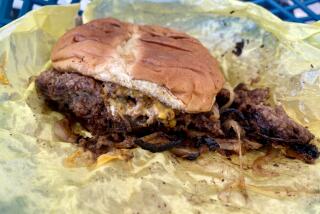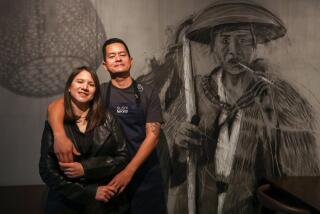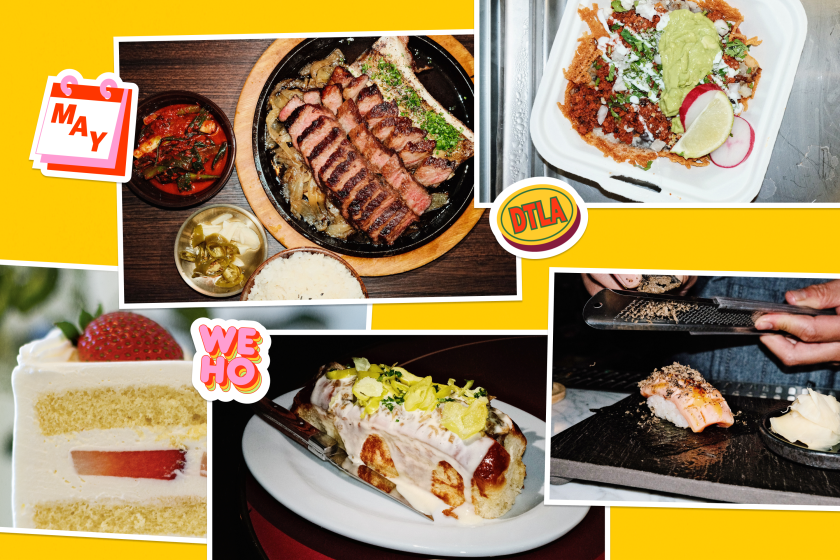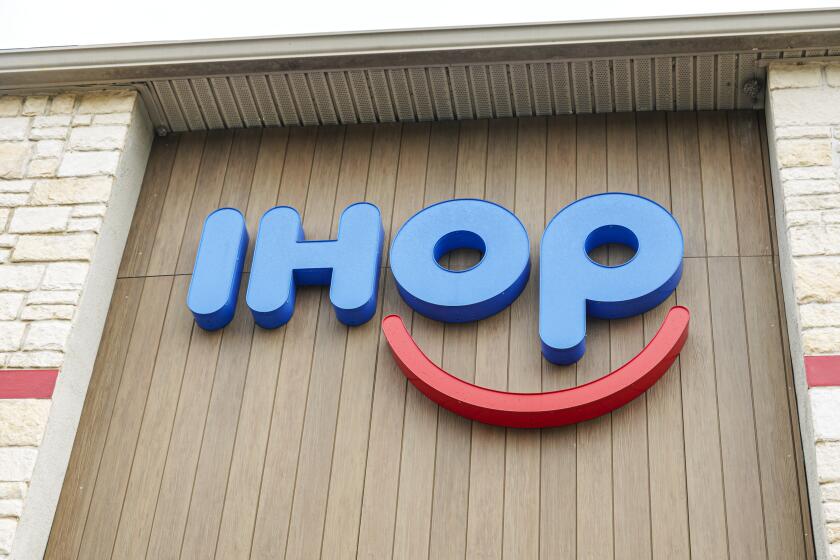Veggie Philanthropist : Charity: Mickey Weiss helps feed hundreds of thousands of hungry people in the Southland by salvaging millions of pounds of unsalable but perfectly edible produce that used to be thrown away.
The occasion was a reception Oct. 16 at the Library of Congress honoring Americans whose efforts had been recognized with Presidential End Hunger Awards. Mickey Leland’s widow, Alison, was there to accept for the late Texas congressman; the mood was reserved, almost somber.
That is, until Mickey Weiss stepped forward to be introduced.
As Weiss had listened to the tributes, his eyes had fixed on a stray grape that had fallen to the floor in front of the dais. Now, in the spotlight, he picked up the grape, dusted it off on his sleeve and, with a flourish, popped it into his mouth.
“That audience just fell apart,” Weiss says.
But it was more than an ice-breaking gesture. It was a nice bit of symbolism. Weiss, after all, has helped feed hundreds of thousands of the estimated 2 million hungry people in Southern California by salvaging 15 million pounds of unsalable, yet perfectly edible, food that once went into dumpsters.
Retired, sort of, at age 74, after 40 years of 15-hour days as a Los Angeles produce merchant--he was known in veggie circles as the “mushroom king”--Weiss is founder of the Los Angeles Wholesale Produce Market’s Charitable Distribution Facility.
The center, which occupies 2,500 square feet of donated dock space at the sprawling market at 8th and Alameda streets, is the collection point each weekday morning for lugs of fruit and vegetables carted over by market merchants. There, donated produce is picked up by charities for distribution to soup kitchens, shelters and others who help the needy.
To those who serve--representatives of the 323 bona-fide charities that benefit--Weiss is a silver-haired angel in shirt sleeves.
“I think they should make him President,” says Brother Michael Murphy of the Divine Word Seminaries. Every day he loads up his Plymouth Reliant with produce for 400 poor parishes in Southern California.
“Thank God, thank Mickey,” says Gloria Kim, who also shows up daily. “Each time,” she says, “we make a big pot of soup” for the downtown homeless. “I feed 300, 500 every day. They love hot soup.”
Mickey Weiss picks up a zucchini from a crate and with his pen knife expertly slices away a section covered with white fuzz. There had been no buyer for this box of squash. But underneath, Weiss knows, 80% of it is No. 1 quality, “the same thing you’d buy in the store for $1.98 cents a pound.”
Nearby, Sister Andrea from the Sisters of the Company of Mary, another regular, is loading her car with vegetables for needy children. She is pleased that today there are crates and crates of chiles--”We can make a very good hot sauce.”
The chiles are a serendipity too for Luis Pinel, president of the Hispanic Apartment Managers Assn. in Long Beach. He will return to Las Brisas, an apartment complex for low-income Latinos, with bell peppers and tomatillos too. In the grocery, he says, “some of these chiles are a buck a pound.”
Early in the morning, the big semis deliver produce to the market from farms and vendors; much of what doesn’t find a buyer or doesn’t pass County Department of Agriculture inspection--possibly for as trivial a reason as incomplete labeling--ends up in Weiss’ corner.
By 3 p.m., his dock will be empty.
“We never know what’s coming in,” Weiss says. “Look here--fresh ginger. Can you imagine that?”
Three or four days a week, Weiss is on the job, ensuring things run smoothly, getting filled in by the food center’s sole paid employee, Miguel Gonzalez. “I say, ‘How’s business today, Miguel?’ and he says, ‘Very good. We gave a lot of stuff away.’ ”
Sixty to 80 tons a week go through the center and directly to charities--no middlemen, no overhead (save for a telephone, whose costs Weiss watches like a hawk).
“Every day you see the results,” Weiss says. “The biggest bang for the buck that charity can give.”
And, he adds, not a penny of city, state, county or federal government money is involved. The total tab is picked up by the Mickey and Edna Weiss Foundation, through which he and his wife support various causes.
In 1987, when the food center opened, that tab was $25,000 a year. Today, it is $37,500. He considers it a good investment, estimating that the center has given away more than $8 million worth of food.
Weiss, who describes himself as a “pick up rubber bands and turn off the lights” sort of guy, worked hard, saved and invested shrewdly.
‘I’m a Giver’
He dismisses descriptions of himself as a “millionaire philanthropist,” saying simply: “I’m a giver. A lot of people are givers.”
Still, he can hardly conceal his delight as he recounts his trip to Washington to accept the individual achievement award as one of 13 End Hunger Award recipients chosen from 130 nominees nationwide.
There he was, the mushroom king, shaking hands with President George Bush in the Oval Office. And--would you believe it--he was the only one the President singled out by name.
Weiss laughs and says: “I was a point of light. That was the first time I knew what ‘a thousand points of light’ meant.”
Over coffee and blueberry muffins at Vickman’s Restaurant and Bakery (formerly Vickman’s Feedbag), a 70-year-old landmark near the produce market, Maurice (Mickey) Weiss talks about his life, a life that gives new definition to the Horatio Alger myth.
He was born in Johannesburg, South Africa, where his father had taken his mother two years earlier from Budapest, Hungary. There, his father and his uncle were in the clothing business. “Nothing fancy,” Weiss says. “They sold secondhand clothing to the blacks who worked in the mines.”
In 1921, his family immigrated to Michigan, where his aunt lived. At 10, Maurice started helping out in the family’s “mom-and-pop” Army-Navy store. Weiss laughs as he recalls those days and says, “Today they’d say the child needs a psychiatrist. Well, maybe I do.”
Then, on a visit to California, his mother fell in love with the climate--it was like South Africa--and, by 1931, had persuaded her husband to move West.
Life was a struggle in post-Depression Los Angeles. His father sold used cars, worked at a brewery, and then, with his son-in-law, “got a truck and went out peddling” fruits and vegetables, Weiss says. “Unfortunately, my brother-in-law was an addicted gambler,” who gambled away the profits.
So after his sophomore year at UCLA, Weiss left academe to help out, starting a produce business with his father out of a garage at Fairfax and Melrose avenues. It began with one truck, but in time they sold produce to the city’s big-name restaurants, including Chasen’s, Mocambo, Ciro’s, Romanoff’s. (Prince Romanoff, he remembers, would call him to his house once every year for 25 years to protest, ‘Mickey, you’re too high.’ ”)
But Romanoff kept buying, as did the others. The key, Weiss says, was service. “If the chef is out six parsleys, that can be an absolute hazard. I saw to it the chef was never in trouble.”
Along the way, Weiss decided to open his own restaurant. It flopped, in a big way. Soon afterward, World War II started, and, as an Army private, he was stationed in Palm Springs--”I served salads at the officers’ mess.” On weekends, he came home to take care of the books for the business.
The fighting was escalating in Europe, and Weiss, not having been through basic training, wasn’t eager to ship overseas. Talking to a quartermaster officer one day, he recalls: “I said the magic word--’I can get you bananas.’ ”
From then on, he went weekly to the Los Angeles produce market and got 50 boxes of bananas. “That,” he says, was like a pass to heaven.”
Price Manipulations
When the war ended, Weiss was still in Palm Springs.
In the late ‘40s, kiwis, dwarf cauliflowers and purple bell peppers weren’t exactly staples on the American table. Neither were fresh mushrooms. Indeed, Weiss couldn’t depend on his mushroom supplier, who manipulated the market to keep prices high.
The man had Weiss convinced that mushrooms were scarce, until “one day I walked into the vendor’s icebox and there they were, thousands of pounds.”
He decided to go into the mushroom-selling business, adding Mushrooms Inc. under the Northern Produce Co. flagship. Today, his brother’s children own and run Northern while his son, Dennis, has West Central Wholesale Produce and is the area’s biggest mushroom supplier.
Weiss drops by regularly to have lunch with Dennis. Sometimes, on his way way home to Westwood, he drops off a few crates of produce for a West Central customer.
Weiss is taking visitors on a tour of the produce market, explaining the perils of the business, how a tomato that comes ripe to the wholesale market won’t sell to the market chains, which want a tomato with a five- or six-day shelf life.
He leads the way to The Mural, a towering creation 30 feet high in two sections of 120 feet, with oranges, onions and a 20-foot eggplant. “My Rembrandt,” he calls it. “Isn’t that a pretty thing?”
The business was good to him, he explains, and “I wanted to give back to the market some of what they gave to me. But what do you give? You can’t give a hand truck or a forklift.”
So, in 1986, he commissioned the mural, and paid for it--”that thing cost 40 grand.”
The charitable distribution center seems such a simple premise. Why had no one thought of it before? Weiss smiles and says, “I don’t know if I’d be interested if I was still getting up at 2 in the morning,” the hour at which produce merchants go to market.
What he wants now is to see similar food centers operating in every large produce terminal in America, and, he says, “I’ll be glad to go and help them.” Los Angeles was the first; now Houston has one.
U.S. Rep. William Emerson, (R-Mo.), who chairs the House select committee on hunger, has invited him to address Congress about hunger. And, Weiss says, “I’m working with Kitty Dukakis now. She wants a center in Boston.”
He has learned one thing: “People give to people, not causes.” He has funded the food center through the family foundation for the next 10 years and has instructed his children to carry it on.
As he sees it, it is a “no-lose” situation: The hungry get the food, the donors get a tax deduction.
“The loser is the man who puts up the money,” he says, “and I’m not a loser.”
More to Read
Eat your way across L.A.
Get our weekly Tasting Notes newsletter for reviews, news and more.
You may occasionally receive promotional content from the Los Angeles Times.






